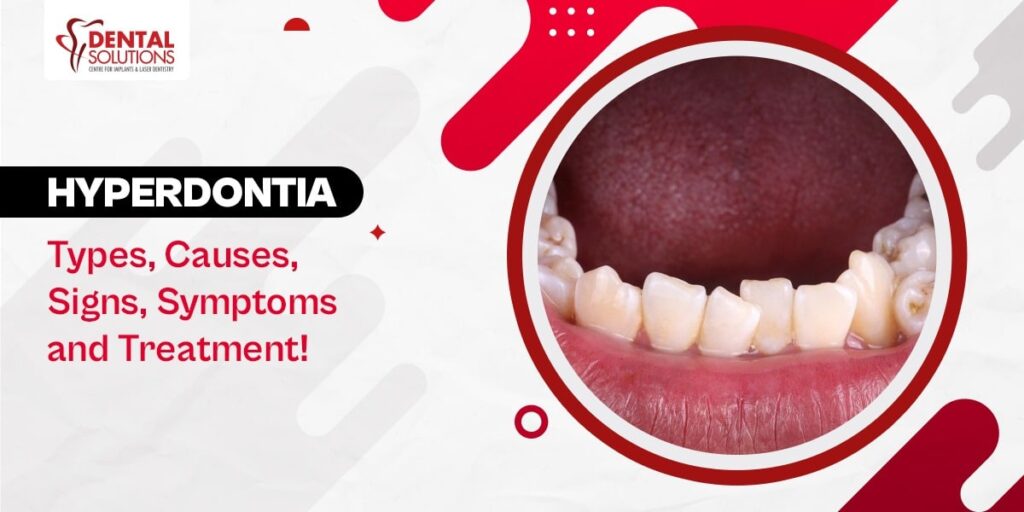What is Hyperdontia?

What is Hyperdontia?
Hyperdontia is the condition of having supernumerary teeth, or extra teeth, in the mouth. These extra teeth can occur in any part of the mouth and can cause problems with the alignment of the teeth and the jaw. It is a relatively rare condition, and it can often be treated by a dentist or orthodontist.
Hyperdontia refers to an excess number of teeth beyond the expected 20 deciduous and 32 permanent teeth. The additional teeth are termed supernumerary
Science Direct
What are the types of hyperdontia
There are two main types of hyperdontia, impacted and erupted.
Impacted hyperdontia: refers to extra teeth that are trapped beneath the gums and have not emerged into the mouth. These teeth may cause pain or discomfort, and they may need to be surgically removed.
Erupted hyperdontia; refers to extra teeth that have emerged into the mouth and are visible. These teeth may cause problems with the alignment of the teeth and the jaw, and they may need to be removed or treated with orthodontic braces. It is important to see a dentist or orthodontist for an evaluation to determine the type of hyperdontia you have and the appropriate treatment.
Causes of hyperdontia
The exact cause of hyperdontia is not well understood. It is thought to be a genetic condition, as it often runs in families. Other factors, such as certain medications and medical conditions, may also increase the risk of developing hyperdontia.
In some cases, the condition may be due to a genetic mutation or a change in the genes that control the development of teeth. It is also possible that hyperdontia can occur as a result of an overactive dental lamina, the tissue that gives rise to teeth during development.
What are the symptoms of hyperdontia
The main symptom of hyperdontia is the presence of extra teeth in the mouth. These teeth may be visible in the mouth or may be hidden underneath the gums. Other symptoms of hyperdontia may include pain or discomfort in the mouth, difficulty chewing or biting, and problems with the alignment of the teeth.
In some cases, the extra teeth may cause crowding or misalignment of the other teeth, leading to the need for orthodontic treatment. If you have any of these symptoms, it is important to see a dentist or orthodontist for an evaluation and treatment.
Is Hyperdontia dangerous if left untreated?
Hyperdontia itself is not dangerous, but it can lead to some complications if it is not treated. The extra teeth can cause problems with the alignment of the teeth and the jaw, which can lead to difficulty chewing or biting, pain or discomfort in the mouth, and other oral health problems. In severe cases, the extra teeth may need to be removed to prevent these complications.
In addition, hyperdontia can also affect the appearance of the teeth and mouth, which can have a negative impact on a person's self-esteem and quality of life. It is important to see a dentist or orthodontist for an evaluation and treatment if you have hyperdontia.
What is the treatment for hyperdontia?
The treatment for hyperdontia will depend on the specific situation and the severity of the condition. In some cases, the extra teeth may be left in place if they are not causing any problems. However, if the extra teeth are causing pain, discomfort, or problems with the alignment of the teeth, they may need to be removed.
This can typically be done by a dentist or oral surgeon. In some cases, orthodontic treatment may also be necessary to straighten the teeth and improve the alignment of the jaw. It is important to work with a dentist or orthodontist to develop a treatment plan that is tailored to your specific needs.
Can hyperdontia be prevented?
Because the exact cause of hyperdontia is not well understood, it is not clear if the condition can be prevented. As mentioned earlier, it is thought to have a genetic basis, so people with a family history of the condition may be more likely to develop it.
However, it is not possible to predict who will develop hyperdontia or to prevent it from occurring. If you are concerned about your risk of developing this condition, it is best to consult with a dentist or genetic counselor. They can provide more information and advice on how to manage your oral health and minimize your risk of developing hyperdontia.
When is the right time to see a doctor for hyperdontia
If you think you may have hyperdontia, it is important to see a dentist or orthodontist for an evaluation.
The extra teeth can cause problems with the alignment of the teeth and the jaw, and they may need to be removed or treated with orthodontic braces.
A dentist or orthodontist will be able to determine the best course of action based on the specific situation and the severity of the condition. It is important to address hyperdontia as soon as possible to prevent complications and maintain good oral health.
Is it safe to extract multiple teeth in case of hyperdontia
In most cases, it is safe to extract multiple teeth in the case of hyperdontia. This procedure is typically performed by a dentist or oral surgeon, who will use local anesthesia to numb the area and make the extraction as painless as possible.
After the teeth are removed, the dentist or oral surgeon will closely monitor the area to ensure that it heals properly. In some cases, additional treatment, such as orthodontic braces, may be necessary to help straighten the teeth and improve the alignment of the jaw. It is important to work with a dentist or oral surgeon to determine the best course of action for your specific situation.
